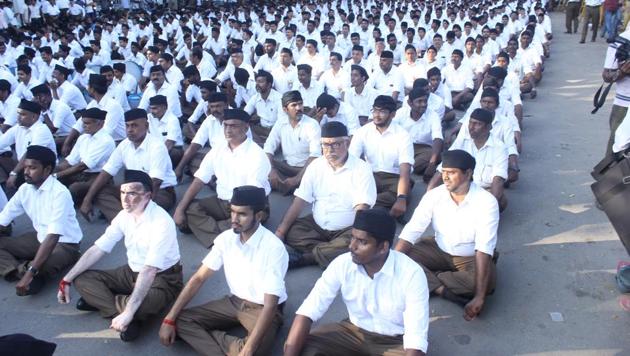RSS meet in Coimbatore fuels speculation of BJP push in Tamil Nadu
The RSS may renew efforts to boost the BJP in Tamil Nadu following the saffron party’s victory in Utttar Pradesh.
BJP chief Amit Shah’s scheduled speech on Tuesday at the end of a three-day meeting of the Rashtriya Swayamsevak Sangh (RSS) in Coimbatore, the first in the organisation’s 92-year-old history to be held in Tamil Nadu has sparked speculation that the stage could be set for the saffron party’s push in the state.

The meeting of Akhil Bharatiya Pratinidhi Sabha (ABPS), the highest decision making and policy formulation body of the RSS, meet was inaugurated by Mohan Bhagwat on Sunday.
Union minister Nitin Gadkari is also expected to address the meeting. Important functionaries of the various organisation that make up the Sangh Parivar - including the RSS, ABVP, the Sevabharati, the Samskrita Bharati, and the Vidhya Bharati have been present at the Coimbatore meeting since it began on Sunday.
Though the RSS has officially maintained that the meeting is strictly concerned with reviewing the activities of the aforementioned groups, and geared towards increasing their numbers in the south, analysts believe that the meeting will also begin plans for the BJP to make inroads in the south.
While the party is the primary opposition in Karnataka, which will see Assembly elections next year, the situation is very different in Tamil Nadu according to experts.
The BJP has failed to get even a toehold in Tamil Nadu.
“The RSS have been working out of Coimbatore for more than 20 years, after the bomb blasts and LK Advani’s march there,” says RK Radhakrishnan , associate editor of Frontline magazine. “They’ve tried to capitalise on communal polarisation in the Western Belt by trying to get the Gounder vote on their side, but to little success.”
For the BJP, acquiring the support of the Gounder community - a powerful and influential OBC group in the state - has been difficult since the 2014 elections, and has been further complicated by Jayalalithaa’s death.
“While Jayalalithaa’s death may have opened up an opportunity, through a series of events we suddenly have a Gounder as chief minister,” Radhakrishan says, referring to chief minister K Palaniswamy. “So the AIADMK has shifted from being a Thevar party to a Gounder one, which makes it harder to get the vote of the already divided community.”
N Sadogapan, Tamil Nadu unit spokesperson for the RSS, told HT that the meeting was not in any way “related to the political functioning of the BJP.”
“The BJP is just a political part of our organisation,” he said. “The RSS meet is to review all the activities we conducted last year, and not to discuss politics.”
He did, however, add that an increase in RSS supporters in the state would also mean an increase in voters for the BJP. “We only assist the BJP in elections when they need workers, so yes in that sense an increase will benefit them,” Sadogapan said.
The BJP itself has also said that the meeting has nothing to do with politics. “This is a regular meeting concerned with the development of the organisation, and increasing the number of RSS workers in Tamil Nadu,” said party spokesperson ANS Prasad.
The RSS, which found it difficult to organise rallies or demonstrations in Tamil Nadu during late chief minister J Jayalalithaa’s regime, conducted its first route march in 16 years in Chennai in January.
According to Sadogappan, the late AIADMK supremo denied permission to the Hindutva organisation citing security reasons following a series of bomb blasts in Coimbatore in 1998.
The murder of a traffic constable in the city was followed by communal riots which killed 18 Muslims. Coimbatore then witnessed a series of bomb blast, killing 58 and injuring more than 200 on February 14, 1998.
A significant part of the struggle that faces the BJP is that, unlike in the North, Tamil Nadu is inimical to the Sangh Parivar and its ideology. “The entire culture of the RSS and its affiliated organisations - from the emphasis on Hindi and Sanskrit, to the way they dress - is unacceptable to the ordinary Tamil,” Radhakrishnan says. “The RSS knows this, and they usually plan their strategies in the long term - so perhaps we may see something emerge in, say, 20 years time.”
Though they have allied with both the DMK and the AIADMK during general elections, the BJP has yet to make inroads in Tamil Nadu.
In 1998, the AIADMK’s alliance with the BJP provided the foundations for forming a national government after Jayalalithaa secured 30 out of the 39 Lok Sabha seats in Tamil Nadu. After the AIADMK withdrew from the alliance, and the BJP lost a vote of confidence, it triggered new elections in 1999.
The Vajypayee-led NDA then allied with the DMK, which won 31 out of the 39 seats. The Dravidian party subsequently left the NDA a few months before the 2004 general elections, which the BJP lost.





